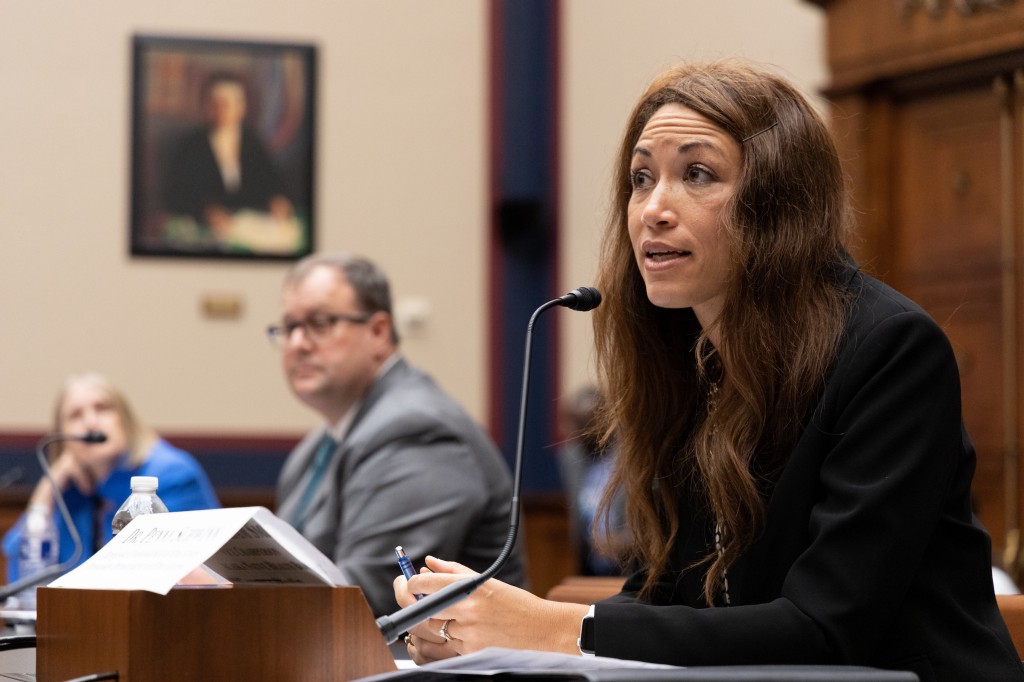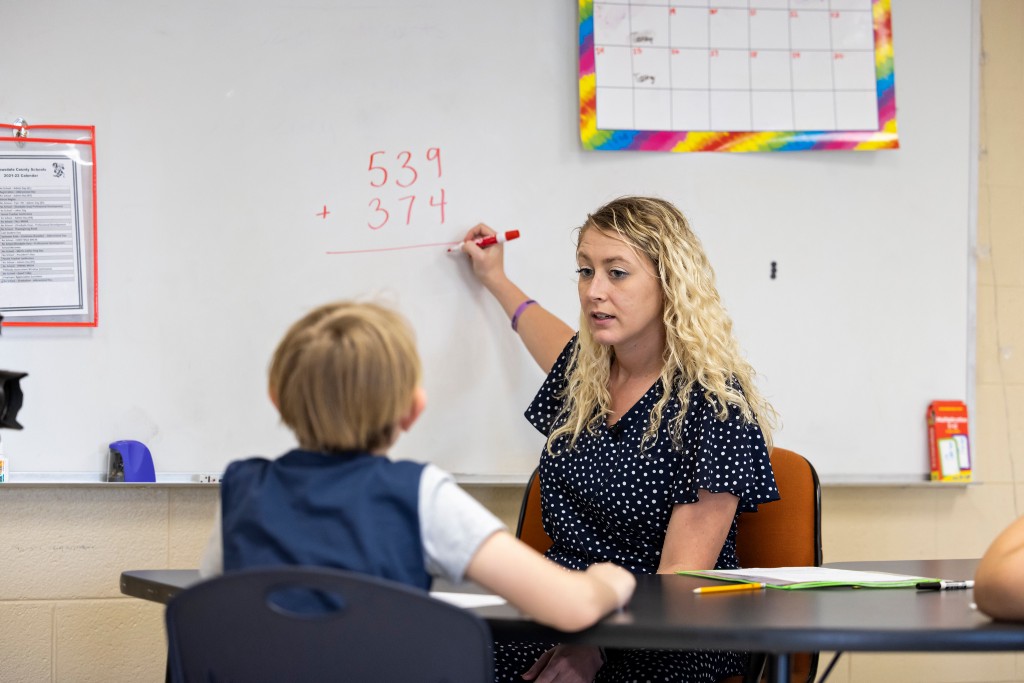High-dosage tutoring is a key strategy contributing to academic progress in Tennessee, the state’s education commissioner, Penny Schwinn, recently told lawmakers on Capitol Hill. Testifying before the U.S. House Committee on Education and Labor, Commissioner Schwinn, a member of Chiefs for Change, said Tennessee posted English language arts results that have largely returned to pre-pandemic levels and that in many cases exceeded the strongest scores the state has seen in five or more years.
“I am inspired by the work in Tennessee schools, encouraged by the pace of our progress, and energized by the urgency with which we move forward,” Schwinn said. She described a range of programs the state has implemented to support academic achievement, including the Tennessee Accelerating Literacy and Learning Corps (TN ALL Corps).

“We started Tennessee ALL Corps; that was part of legislation that was passed in January 2021,” Schwinn explained. “It has several parts. The first are grants to school districts — it’s matching grants to provide high-dosage tutoring. That is one to three students maximum for 30 to 45 minutes, two to three times per week. We funded enough for 150,000 [students]. That is now sustained in our new funding formula forevermore because we have seen such powerful impacts.”
A second component of Tennessee’s tutoring plan is community grants that allow K-12 systems to partner with local organizations delivering the same high-dosage, low-ratio tutoring. A third component is funding, allocated in the form of microgrants, to 14,000 families from low-income communities whose children were most negatively impacted by school closures in the early days of the pandemic. The microgrants allow children to receive tutoring and instruction specifically in early literacy. The fourth component of the state’s plan is free, online, on-demand tutoring for high school students. That support is set up so students aren’t pulled out of class, can participate in afterschool activities, and can still get tutoring in the area in which they need help.
TN ALL Corps is now the largest tutoring program in the nation, and other places are looking to follow Tennessee’s lead.
“About a third of districts are putting money towards tutoring and coaching, mostly for math and reading,” Phyllis Jordan, associate director of FutureEd, an education-focused think tank at Georgetown University’s McCourt School of Public Policy, said at the hearing. She explained that FutureEd analyzed federal Covid relief aid spending for 5,000 school districts serving 74 percent of students in the United States. The analysis found that systems are expected to invest $3 billion in tutoring and coaching nationwide.

Given the interest in tutoring and the need to ensure that it is done well, Chiefs for Change produced a guidebook modeled after TN ALL Corps. The guide is free and publicly available for any K-12 system to use. When the guide was released in November 2021, Commissioner Schwinn said Tennessee has seen the remarkable impact that tutoring programs can have. “I’m thrilled that Chiefs for Change is building on and sharing the learnings from our state so that systems across the country can implement their own initiatives,” she said.
In a related effort, former Mississippi State Superintendent of Education Carey Wright, also a member of Chiefs for Change, engaged the network to help develop a tutoring guide specifically for her state.
“We worked very closely with Chiefs for Change to be sure that we had a document that would be beneficial to our teachers and administrators in Mississippi,” said Laurie Weathersby, bureau director of student intervention services for the Mississippi Department of Education.
During a webinar to introduce educators to the guide, Weathersby explained that the state incorporated “research and best practices for schools and districts,” saying that the team “included a lot of resources, suggestions, strategies to support the implementation of effective tutoring practices.”
Weathersby also pointed to another element of the guide that she believes is particularly useful — a tutoring calculator. “It can be used to determine the number of tutors and the cost that would be associated with the programs. So you’re actually able to plug in the number of students that you would like to receive tutoring, the number of tutors that you would have available, and it really helps you calculate: What is this going to look like?”
Research has shown the “transformative potential of tutoring” on learning outcomes. As one example, a study by the University of Chicago Education Lab found students who received tutoring through the nonprofit Saga Education program learned as much as an extra two and a half years of math in one academic year. Under the Saga directly run service model, full-time tutors lead small-group tutoring in secondary math grades in designated class periods for 50 minutes daily during the school day throughout the entire school year.
Commissioner Schwinn was asked how tutoring sessions are structured under TN ALL Corps.
“We have actually seen that the most strategic place for us is in school,” she told the committee. “It is also a strategy for addressing the teacher shortage issue. Our districts are hiring full-time, credentialed teachers — sometimes retirees or career changers. They are then doing the tutoring during their intervention block and very, very small group instruction.”
She continued, “I will call out, though, that we have a great example in Union County for afterschool programming, where they are retired or existing teachers tutoring their own students or their students from the prior year. They already have relationships with the families, and they actually schedule the tutoring sessions in partnership with families, so the trust is there. The tutor is very well trained; certainly is a certified teacher. They are compensated well above and beyond what they would normally get in terms of their salary, and they already have those strong relationships and knowledge base so there is consistency with the curriculum and the approach at that specific school site.”
Commissioner Schwinn emphasized that a key part of the state’s strategy is making evidence-based investments with an eye toward sustaining those that are shown to make a positive difference. When asked how Tennessee is evaluating the impact of its tutoring programs, she said, “In English language arts, we look at their benchmark assessments. We also have a relationship with [the curriculum provider] Zearn, so we get that data on a monthly basis. We look at what practices are showing very strong acceleration at the school level, the district level, and then actually with individual students — and our team goes into districts and [partners] with them in our networks.”
Schwinn added that, beginning this year, the state has tutoring networks to evaluate the data and make adjustments based on what is working and what is not working in order to accelerate learning in every tutoring program.
“We’ve heard talk of bold action, read papers of what is possible, and dreamed of what could be true for our students, our teachers, and our schools,” Schwinn said at the hearing. “The challenge I offer to all of us is that we turn the possibility into the reality: Make bold action for kids the expectation, not the exception. For us, bold action means a comprehensive literacy strategy and the largest tutoring program in the country.”